Well, hallelujah and hurrah, I finally finished out the final draft of The Golden Road which was conceptualized something like five years ago when I mentally mapped out another trilogy-companion set to the Adelsverein Trilogy. Yes, there would be a book about Margaret Becker Vining Williamson, which would slot into the sequence as a prelude to the trilogy – and that took two books to bring to completion. (She was a fascinating character, who saw a lot of Texas history either happen right before her eyes, or just around the corner and out of sight.) There would be a book following on to the Trilogy – the Quivera Trail, which would pick up with Dolph Becker’s English wife and her travails in a new and alien country. And – in between the first and second Adelsverein volumes, there would be the Gold Rush adventures of Magda Vogel Becker’s young step-brother, Fredi Steinmetz. Fredi appeared as a minor character with some brief dramatic turns in the plot. He had gone to California following the rush for gold … but was never forthcoming about what he had done and seen there, between the settling of Gillespie County and the start of the Civil War. I always wanted to write a Gold Rush adventure somewhat like The Travels of Jaimie McPheeters, or so I told myself … but it kept being put on the back burner, metaphorically-speaking. I bashed out the two books about Margaret, and then Quivera Trail … for a good bit, I was actually writing them simultaneously. When I got bored or stuck, I’d work on the other. Which is a good method, as long as one is equally motivated. And then I wandered off-track.
First it was Lone Star Sons, then I got taken up with Sunset and Steel Rails – in which Fredi appeared as an older man, a hard-bitten, yet courtly romantic interest for a heroine who chose (through a series of dramatic circumstances) to be a Harvey Girl – and then by the ongoing Luna City Chronicles. Really, I wonder just how much I did want to write a Gold Rush adventure after all, since it kept getting back-burnered so frequently. I posted the first chapter in January, 2014 – but two years in the writing is about par for me, in a historical. So – actually not all that bad in the actual writing and research. So – finally roughed out, start to finish, send to the beta readers, and now to buckle down again with the various contemporary accounts collected. Lot of blanks to fill in – where, for example, was Mary Ellen Pleasant’s boarding house/restaurant in 1856-57? What were the names of express companies in operation in the northern diggings in that same year? How far degraded had the riverbank of the middle fork of the Yuba River become by that same period? Had that vicinity pretty well been overtaken by hydraulic mining – in which whole hillsides were washed away by huge gets of water. And how – exactly were daily newspapers distributed in San Francisco. I am certain that subscribers must have had theirs delivered, and equally certain that they were also sold on the streets … anyway, back to work.
The fall book event schedule carries on this Saturday with the Boerne Book Festival in Boerne, at the Patrick Heath Library, a little off Main Street at Johns Road, just past Main Plaza Park. I’ll be set up in the park and amphitheater by the side of the library – hope to see you there! When the market schedule lets up, after Christmas, I will turn to working on two more book projects – another Lone Star Sons adventure, and the 4th Luna City Chronicle for release in late 2017.
This is absolutely awesome – this particular find, since it falls just within the scope of the current WIP. A whole Mississippi/Missouri-era steamship, with a cargo of goods intended for frontier settlements, sunk in the mid-1850s with cargo entire, There are so many artifacts retrieved, that they have to display them in an old department store, and take advice from retail…
Behold – the Steamship Arabia! (or a reasonable facsimile thereof.)
(So, I have been able to pick up the story of Fredi Steinmetz, adventuring in Gold-Rush era California, having finished some other projects and the second Chronicle of Luna City. He and his eccentric and slightly mysterious friend O’Malley have spent an eventful two months in San Francisco, waiting for winter to end in the diggings, working at odd jobs, encountering interesting people, and making friends – among them, an apparent orphan boy of about 14, Edwin Barnett … whose history might just be the equal of O’Malley’s for mystery and intrigue. But Edwin knows of a potentially rich dig in the lower Sierras … and so he becomes a third partner …)
Chapter 12 – To the Mines
The wagon packed high with supplies, a canvas tent and bedrolls, as well as a contraption that Edwin said was a ‘cradle’, O’Malley and Fredi finally departed from San Francisco on a foggy morning early in May. They took deck passage on a relatively comfort-less and therefore cheap freight steamboat bound to Sacramento and beyond as far as Yuba City for the wagon, mules, and themselves. With some difficulty they urged the mules over a wide gangplank laid between wharf and the blunt prow of the boat, drawing the wagon after, and found an open space between the neat piles of fuel cordwood and bales of goods bound for the mines, which were stacked on the main deck. Edwin Barnett with Nipper in his arms, clung to a high perch on top of the cargo, as the side-wheel steamer threshed out into the bay, heading north towards Vallejo and the old territorial capital at Benicia, and from there into the tangled delta of the American River. It was estimated they would be a week or so at this – a considerable savings in time over driving the wagon all the way. The patchwork heights of San Francisco and the forests of ships’ masts in harbor vanished very soon in a billow of fog. Within a short way, every surface was wetted with condensation, collecting in beads of moisture. The slight vibration of the mighty steam turbine below deck shook rivulets of water from every slanting surface. It felt to Fredi like the beating of a mighty heart. O’Malley, the boys and the dog huddled in blankets, under the dripping wagon cover, and the mules stood miserable with their noses together.
“This is the first time I have ever been on a steam ship,” Fredi’s excitement at this new experience overcame the misery of passage across the open bay.
“I’m glad to be away from there, Fredi-boyo,” O’Malley confessed. “Between the crimps kidnapping men off the street, an’ murdering swine like that devil Cora, not to mention the fires and the constant pestilential weather … I dinna care to stay a moment longer. There’s a feeling in the city like a storm about to break – a dangerous mood, when honest, well-intentioned men are becoming fed to the back-teeth with corruption and vice. There’s murder in the air, an’ I want none of it.”
“Mr. King was always carrying a revolver, there were so many threats against him for what he printed in the Bulletin,” Fredi nodded in agreement. He had been half-appalled, yet tantalized by the chaotic, haphazard life of a large city, the like of which he had never experienced before. The seamy, vice-ridden waterfront district, the haphazard tents and shanties climbing up the sandy slopes of Russian Hill, muddy streets, magnificent gambling halls and theaters, jousting uncomfortably with the respectability of churches and luxurious mansions, all hung over with the smoldering threat of violence … and fire. Sober Yankee businessmen, elbow to elbow with edgy chivalric gentlemen from the South, Chileans and Chinamen, Kanakas from the Islands of Hawaii, sailors from every nation, swaggering thugs, straight off the latest ship from the Australian prison colonies – and madmen in plenty, most of them mad for gold. Nothing in Fredi’s previous life had ever prepared him for this, not the cattle trail from Texas, or the staid and orderly streets of Fredericksburg, back in Gillespie County.
“It’s not like there is any more law in the diggings,” Edwin now said, morosely. “There are brigands and bandits and claim-jumpers a’plenty.”
“For certain there are,” O’Malley said, agreeably. “But they are few and go against the company of righteous men – they have not suborned the law to feather well their own nests. So, tell us, now – there are rich diggings in the hills between … which river is it?”
“Between the middle and north forks of the Yuba River,” Edwin nodded, rubbing the end of his nose with the back of his sleeve. “They called it Coarse Gold Hill, sometimes Pine Tree Diggings … it’s far enough up into the mountains beyond Camptonville, to where the snow closes down the diggings in late fall.”
“And you know of rich diggings because …” O’Malley hinted broadly and Edwin replied, “I had kinfolk with a claim there. A rich one … which still ought to be mine, by right. But it has been left for months …” and Edwin’s pale, peaked face was adult in its adamantine determination. “But I know where the best and most promising part of the diggings lie – and if we are the first to reclaim and stake our own claim … this will be worth the journey. I promise you fellows …” Edwin blushed, boy-like, and embraced Nipper even closer, as if for security, and Nipper, who above all else hated cold and wet with an uncharacteristic passion for a dog, licked the lad’s cheek, and burrowed deeper into the shelter of the blanket wrapped around them both. Edwin continued, “You are both stout fellows and have been good friends to me, so a third each of the gold in this claim; that would be fair, would it not? And we are good friends, aren’t we … three in fortune and friendship, like the royal musketeers in that French novel of M. Dumas … All for one and one for all?”
“We are indade, boyo,” O’Malley answered, comfortably, “Although Fredi-lad and I have been true companions these many months … to admit another to our fellowship – especially a trusty fellow with knowledge of the mines – is a most providential occurrence. You have a skill, complimentary to mine and Fredi’s. So you see, we shall get on very well, I believe. Even more when we get out from this pestilential fog. My oath upon it, lads – there is nothing to equal this fog and misery, not even in old Eire…” More »
This was on the grounds of the Museum of Texas Handmade Furniture – which as it turns out – is a little bit off the road from where we go once a month for the local Tractor Supply outlet; a lovely meadow dotted with oak trees, patches of wildflowers, and old houses, moved onto the property to be an indoor-outdoor museum.
- A tall windmill
- Cooking over a camp-fire meant a lot of pots, pans, and metal rods.
- And then you have glam-camping, 19th century style
- One of the old houses – two small cabins with a breezeway between, and aloft overhead
- Carefully, carefully…
- And then it went BOOM!
- A Family station wagon, 19th century style.

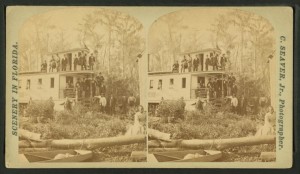
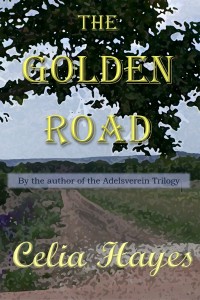
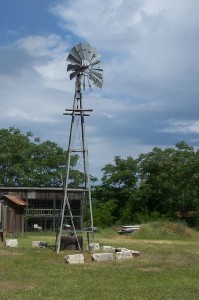
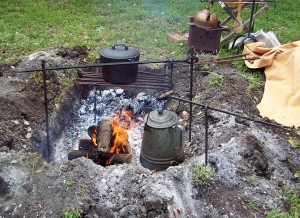
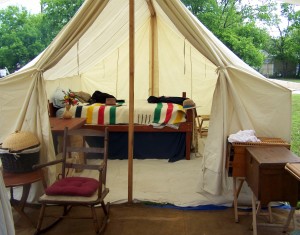
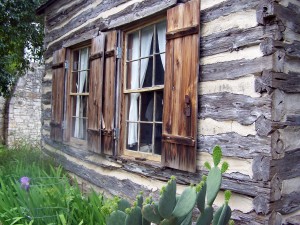
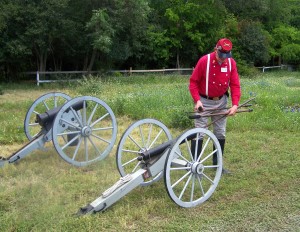
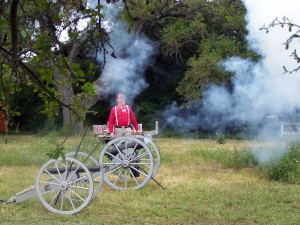
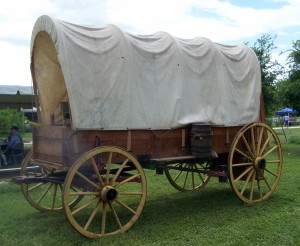
Recent Comments